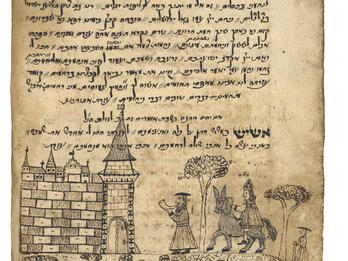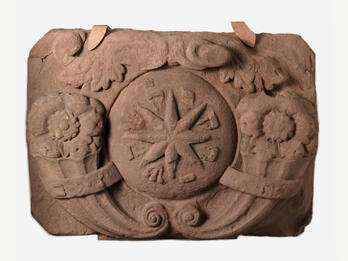Responsum: On a Wayward Wife
Sensitive Content
Question 1: May our teacher and master, the great rabbi, who sits on the throne of halakhic rulings, please instruct and enlighten us regarding an episode that unfolded here in our city of Pisa, may God protect it, which has left us uncertain as to how to proceed.
The incident in question unfolded as follows: Reuben, for commercial reasons, went together with his wife to a city that was populated entirely by gentiles, where they stayed for a year or so. One day, Satan took hold of the woman and she was seized by a strange sprit. For she left her husband’s house and went to the gate of the city governor in order to convert, to take off her Jewish head covering, and to remove the crown of modesty from upon her head. When the man came home, he looked around and saw that his wife was missing. As he was wandering around the town searching for her, the local gentiles told him that if he was looking for his wife he should not bother, as she was sitting in the governor’s courtyard, and that she wished to convert and become one of them.
Upon hearing these comments from the uncircumcised, the husband’s heart fainted, for he did not believe them [see Genesis 45:26]. He came before the governor’s gate [see Esther 4:2], at which point he saw with his own eyes and heard with his own ears that they had been speaking the truth. He got hold of himself, rode upon his horse as fast as he could, and informed the girl’s father and relatives of what had happened. Together, they all quickly but cautiously rushed to the governor’s inner courtyard to ask him about her fate. They received the following reply, “We will call the damsel, and inquire at her mouth” (Genesis 24:57). She was called, and asked, “Will you go with your father, or do you wish to convert as you declared to us earlier?” She understood from her father’s hints, and she also heard from her brothers, that her mother had died from her illness. At that, she was filled with remorse and declared that she wanted to return to her previous state and to Judaism, as before. When he heard what she had said, the governor grew angry, rebuked her father and husband and banished them from his presence with the admonishment, “You shall no longer see my face” [see Exodus 10:28] and they left him greatly annoyed [see Exodus 11:8].
However, they allowed themselves no rest until they had extracted her from among the gentiles and she had returned to her previous state in her father’s house and to her husband—in the name of Israel, praised be He who draws near those who have become far, for she was rescued from the snare of apostasy.
Now, my question to the master is whether she is permitted to her husband, or is she perhaps forbidden to him because she was alone with gentiles, in their domain, for a month, during which time she lived in the house of the lord of the city, together with his slaves and maidservants. Conversely, should we believe her and accept her claims in her defense, as she maintains that she is pure and was not defiled by them. She also offers a justification for her terrible behavior, as she contends that her husband threatened to kill her and her father over a financial dispute between them, and all she wanted to do was find somewhere to hide for a short while until the storm blew over. Accordingly, she initially went to a house of a certain gentile, where she intended to stay for four or five days. However, the gentile was afraid that her husband might find out and accuse him of impropriety, and therefore he told her that she could not protect herself by remaining in his house. Instead, he suggested that he take her to the governor’s place, where she would be safe. She added that when the governor asked her why she came she replied that she was running from her husband, as she was scared of him. Subsequently, however, all the members of his household came together to entice her and draw her away from her religion, until she succumbed and declared that she wanted to convert. She maintained that opinion for only one evening and the following morning, no more than a single day, for when she saw her father and brothers, she regretted her decision and wished to return to her former position among the daughters of Israel. She further argued that were it not for the beatings she had suffered from her husband and his threats to kill her, she would never have imagined saying that she wanted to convert, God forbid. All this is her self-justification, while the husband denies her claims in part, as he maintains that he never hit her. He does admit that he threatened her, but he contends that this has always been his manner of speech. Please let the master instruct us in the law regarding this woman, and may he receive his reward from heaven.
Response: [ . . . ] Since she did not actually convert, the end result is indicative of her original motivation, that she did not have a bad intention; rather, she acted as she did out of fear. I have heard many people, including respectable individuals, maintain that in such cases, when a Jewish wife was raped, the sages and rabbis would compel her husband to divorce her and then betroth her and marry her a second time, in order for her to be permitted to him. I asked the master whether in this case it is proper to follow that practice, to remove all doubts and concerns. I did not want to make this decision myself, but rather to follow the ruling of a greater authority. I therefore await the decision of the honorable rabbi; may it come to us like the rain, as the watering of rainfall [see Hosea 6:3]. Please do not delay, for the sake of the service of God and peace here in the holy congregation of Pisa, may God protect it.
Written and signed in the name of the Torah and the divine service, in the aforementioned congregation, by Jacob, one of the servants of my master, with respect to our teacher and master, R. Moses Seneor, may he find success.
Credits
Jacob Senior, “Responsum: On a Wayward Wife” (responsum, Pisa, mid- to late 17th century). Published in: Refa’el Mildolah, Sefer mayim rabim … she’elot u-teshuvot, Vol. 3: Even ha-ezer, ed. David ben Refa’el Meldolah, vol. 3 (Amsterdam: Yosef Dayan, 1737), pp. 1a–1b.
Published in: The Posen Library of Jewish Culture and Civilization, vol. 5.




